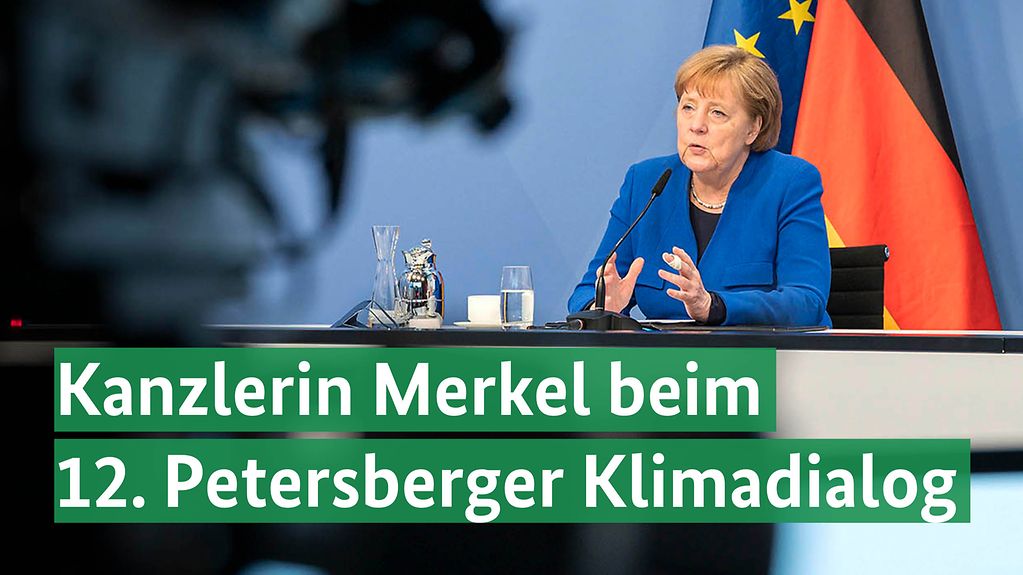Petersberg Climate Dialogue
At the Petersberg Climate Dialogue, Chancellor Angela Merkel has called for swift action and international solidarity in the fight against climate change. She announced that the German Federal Government will be revising its national climate targets.
4 Min. Lesedauer

Chancellor Angela Merkel highlighted climate neutrality as the common global goal.
Foto: Presse- und Informationsamt der Bundesregierung
At the 12th Petersberg Climate Dialogue, Chancellor Angela Merkel highlighted climate neutrality as the common global goal. “In the interests of the generations to come everywhere in the world, we must act swiftly and decisively in order to mitigate the dramatic consequences of global warming,” she said.
UN Climate Change Conference should be a success
How can we adapt to climate change? How will we finance climate action worldwide? What rules should apply in future to the international carbon markets? These questions were the focus of this year’s Petersberg Climate Dialogue, which was attended by representatives of about 40 states. Since 2010, the Petersberg Climate Dialogue has provided a forum for the discussion of topical climate change mitigation issues at international level. It has become an integral part of international climate policy. It paves the way for the UN Climate Change Conference, that is to be held in Glasgow in November 2021. The Dialogue is always co-hosted by the nation that is staging the next Climate Change Conference, in this case the United Kingdom.
Climate-neutral EU by 2050
Discussions began with the climate targets already announced by several major economies. Chancellor Angela Merkel welcomed the fact that many industrialised countries have stepped up their climate action efforts. The member states of the EU and the European Parliament have agreed on a binding European Climate Law – by 2030 greenhouse gas emissions are to be reduced by at least 55 per cent of the 1990 level. The new Climate Law is to make the EU’s target of becoming climate-neutral by 2050 legally binding. This will translate into practice the agreement reached among EU leaders during Germany’s Presidency of the Council of the European Union.
German Federal Government revising climate targets
All states are called on to reduce emissions in order to meet the objectives set out in the Paris Agreement on climate change. Germany has already reduced its CO2 emissions by 40 per cent of the 1990 levels.
“In Germany, we have set out our path to climate neutrality in a Climate Change Act. And we are working at full speed on implementing it, for instance ending the use of coal to generate power at national level and further expanding the use of renewables,” explained Chancellor Angela Merkel. “We are planning to further specify and develop the objectives set out in the Climate Change Act.”
Following a ruling of the Federal Constitutional Court, the German Federal Government intends to focus more on inter-generational justice in the field of climate action, and to specify the path to climate neutrality in more detail. “We will thus raise our national emission reduction target for 2030 by 10 percentage points to 65 per cent, and aim to achieve climate neutrality in 2045 rather than 2050,” declared Angela Merkel.
Worldwide carbon pricing
Chancellor Angela Merkel pointed to carbon pricing as a particularly effective way of steering emissions. On the common road to climate neutrality, she said, it would be desirable to gradually introduce a market-appropriate and efficient system of carbon pricing worldwide.
Securing international climate financing
Chancellor Angela Merkel agreed with British Prime Minister Boris Johnson that developing countries need special financial support. She pointed out that in the field of climate change mitigation, what is important is that we all pull together. “That means that we need international solidarity.”
In Copenhagen in 2009, the industrialised countries set the goal of mobilising 100 billion US dollars every year up to 2020 from public- and private-sector sources to fund climate change mitigation and adaptation to climate change in developing countries. At the 2015 Paris Climate Change Conference it was agreed that the annual provision of 100 billion US dollars would apply until 2025. At the next UN Climate Change Conference, participants will thus have to discuss a new financing target for the post-2025 period.
Germany has already raised its budget for climate change mitigation and adaptation to climate change over recent years. The target of doubling German climate financing to a total of 4 billion euros between 2014 and 2020 was already exceeded in 2019. In addition to the funding from the national budget, Germany provides contributions in the form of public loans as well as mobilising private-sector funding. “The German contribution, if we take all sources both public- and private-sector, totalled almost 7.6 billion euros in 2019. The level was comparable in 2020,” declared Chancellor Angela Merkel.
In response to a proposal of Chancellor Angela Merkel, the German Federal Government has staged the Petersberg Climate Dialogue since 2010. The first dialogue was held on the Petersberg, near Bonn. It is always co-chaired by the country that is to host the next UN Climate Change Conference. This year, it was co-chaired by the United Kingdom. The next UN Climate Change Conference is to be held in Glasgow from 1 to 12 November 2021.